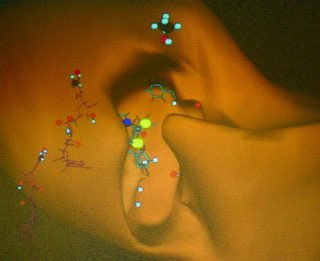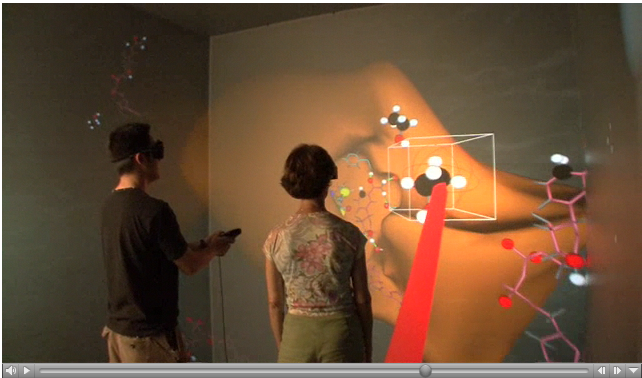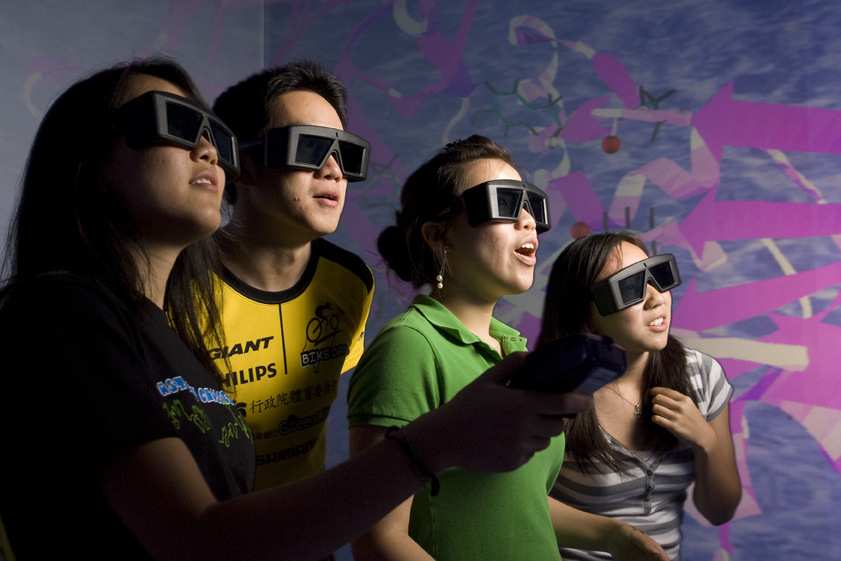Rochelle Schwartz-Bloom, Director, Duke Center for Science Education
Director, RISE (Raising Interest in Science Education)
Professor of Pharmacology
Project Description
 The major goal of the project was to develop an immersive 3D virtual model to teach students chemical oxidation using a context that is relevant to students—alcohol metabolism. The model, developed for the DiVE, shows how alcohol is oxidized by 2 forms of the same liver enzyme, ADH. One form increases the risk of alcoholism, and another form decreases the risk. To carry out the project, 5 undergraduate students of different majors took Pharmacology 197/198 (Independent Study in Science Education). Working together the students developed the molecular models of alcohol and the enzymes according to their published structures, and built an interactive virtual reality experience, in the form of several games. The complete program takes about 35 minutes, and is also available in a web-based form. A separate group of students developed a tutorial for use by teachers interested in using the program in their chemistry classes. Click on the image, below, to see video excerpts of the program.
The major goal of the project was to develop an immersive 3D virtual model to teach students chemical oxidation using a context that is relevant to students—alcohol metabolism. The model, developed for the DiVE, shows how alcohol is oxidized by 2 forms of the same liver enzyme, ADH. One form increases the risk of alcoholism, and another form decreases the risk. To carry out the project, 5 undergraduate students of different majors took Pharmacology 197/198 (Independent Study in Science Education). Working together the students developed the molecular models of alcohol and the enzymes according to their published structures, and built an interactive virtual reality experience, in the form of several games. The complete program takes about 35 minutes, and is also available in a web-based form. A separate group of students developed a tutorial for use by teachers interested in using the program in their chemistry classes. Click on the image, below, to see video excerpts of the program.
 Three different assessments were carried out during the funding period to assess content knowledge learned and student attitudes about the program. The first two provided formative data, and the third was a pilot study for a major grant. The first assessment targeted high school students, who demonstrated a significant increase in knowledge of chemical oxidation after viewing a preliminary version of the program in the DiVE. The second assessment, carried out in a Duke Pharmacology course (Pharm 150) during Fall 2008, showed that the interactive component of the program did not improve knowledge of oxidation compared to a non-interactive version. The small sample size (n=22) may have prevented detection of any significant differences. The third assessment was carried out in an accelerated intro chemistry course at Duke (Chem 23L) during the Spring 2009. ([The assessment was carried out as a senior thesis project by a Duke chemistry student (Dave McMullen)]. In this pilot study, students (n=121) were randomized into 3 groups to learn about alcohol oxidation; 1) a typical paper handout, 2) the DiVE program, and 3) a web-based version of the DiVE program (non-immersive), in the Duke LINK classrooms. Several outcomes were measured. There was no difference in the knowledge about oxidation among the 3 groups. It is possible that the immediate assessment (within 15 minutes of the intervention), or the single short exposure, did not allow the students to consolidate knowledge. However, the students in the DiVE group expressed a greater interest in the content compared to the other groups, and they thought that they had a better understanding of oxidation (even though they did not demonstrate this). This pilot data will enable Dr. Schwartz Bloom to apply for funding from the National Institute on Alcohol Abuse and Alcoholism (NIAAA) to carry out a more thorough assessment of the impact of the program on learning.
Three different assessments were carried out during the funding period to assess content knowledge learned and student attitudes about the program. The first two provided formative data, and the third was a pilot study for a major grant. The first assessment targeted high school students, who demonstrated a significant increase in knowledge of chemical oxidation after viewing a preliminary version of the program in the DiVE. The second assessment, carried out in a Duke Pharmacology course (Pharm 150) during Fall 2008, showed that the interactive component of the program did not improve knowledge of oxidation compared to a non-interactive version. The small sample size (n=22) may have prevented detection of any significant differences. The third assessment was carried out in an accelerated intro chemistry course at Duke (Chem 23L) during the Spring 2009. ([The assessment was carried out as a senior thesis project by a Duke chemistry student (Dave McMullen)]. In this pilot study, students (n=121) were randomized into 3 groups to learn about alcohol oxidation; 1) a typical paper handout, 2) the DiVE program, and 3) a web-based version of the DiVE program (non-immersive), in the Duke LINK classrooms. Several outcomes were measured. There was no difference in the knowledge about oxidation among the 3 groups. It is possible that the immediate assessment (within 15 minutes of the intervention), or the single short exposure, did not allow the students to consolidate knowledge. However, the students in the DiVE group expressed a greater interest in the content compared to the other groups, and they thought that they had a better understanding of oxidation (even though they did not demonstrate this). This pilot data will enable Dr. Schwartz Bloom to apply for funding from the National Institute on Alcohol Abuse and Alcoholism (NIAAA) to carry out a more thorough assessment of the impact of the program on learning.
A summary of the program was presented at the IEEE Virtual Reality meeting in March, 2009 (abstract), and in January 2009 at the Visualization Friday Forum at Duke.
Try out the game yourself!
photo credit: Les Todd
Project start date: 5/4/2007
Funding awarded: $ 6,500
Additional information:
Duke University Visualization Technology Group
RISE (Raising Interest in Science Education)
Other projects by Pharmacology 150
Duke Center for Science Education
Description of project in Duke Research Blog


